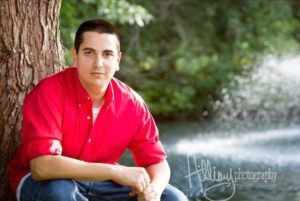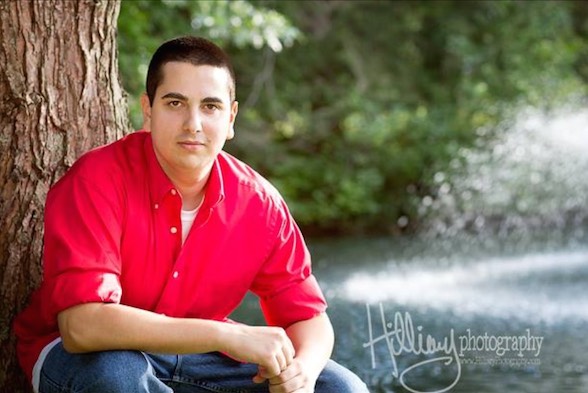
Vince Miozzi | Courtesy
As freshman Vince Miozzi left the hospital in November with the good news that everything still looked great after a regular checkup, a doctor came running up behind him to take him back to an exam room.
“We missed something,” Miozzi said his primary oncologist told him. “Something looks wrong. It’s in your blood counts.”
Miozzi went under anesthesia for a biopsy. That evening, the results came in: He had relapsed.
He had leukemia, again.
“You’re kidding, right?” Miozzi said was his first reaction.
He had just started his freshman year at Hillsdale College, leaving behind his parents and four younger siblings in Solon, Ohio, near Cleveland. He said he planned to major in politics, and loved his U.S. Constitution and Mathematics and Deductive Reasoning courses. He was engaged in College Republicans and Young Americans for Freedom. All he needed to do to become a member of Delta Tau Delta fraternity was take a test.
“The first time I felt drained, like I had mono or the flu bug,” Miozzi said. “This time, I felt great. I was exercising all the time. I had a nice routine. I felt blindsided by this relapse.”
Miozzi opted to have a bone marrow transplant, instead of just chemotherapy, because he said he couldn’t rely on his own body to function properly anymore. He would need a bone marrow donor. What he didn’t know at that point was that his donor, against the odds, would be his 13-year-old brother — the same age Miozzi was when he was diagnosed the first time.
In September 2010, Vince Miozzi was an eighth grader busy with his football team and school. At first, he said he thought those were leading him to eat poorly, feel fatigue, and lose 20 pounds in two weeks. Then, doctors suspected mononucleosis, but they diagnosed him with leukemia.
“When you think cancer, your mind goes to the worst spot,” Miozzi said. “But that’s not what happened. I was more anxious to get it over with.”
Specifically, Miozzi had acute lymphoblastic leukemia, a type of quickly progressing cancer that develops from young white blood cells called lymphocytes in the bone marrow.
He started weekly chemotherapy immediately and was taking oral medications two to three times a day. Complications, however, kept him intermittently in the hospital for the three years he was sick. At one point, blood stopped flowing to his legs. He had two strokes.
“I had a lot of side effects most people don’t normally have,” Miozzi said. “It was difficult.”
He said he remained determined, though, and eventually, his doctor said the chemotherapy would do more harm than good. The cancerous cells were gone.
Miozzi returned to school for his junior year. While he was sick, his teachers had come to the hospital and his house to keep him on track for graduation.
He heard about Hillsdale on Rush Limbaugh’s radio show.
“I liked that it was a small school,” Miozzi said. “When I was diagnosed, I received home instruction with a lot of one-on-one action. Hillsdale was a more similar fit.”
As a student at Hillsdale, he met some close friends, who have stayed in contact with him during his relapse, Miozzi said.
Junior Jacob Weaver met him on his first day at Hillsdale, helping him to move into Niedfeltd Residence. He would later recruit Miozzi for Delta Tau Delta and has kept in contact through texts messages since Miozzi left campus.
“He is someone you would never know has battled leukemia,” Weaver said. “He has a sense of joy … Even with his relapse, he’s a kid who will laugh, smile, and never stops fighting.”
Though his friends have kept in touch, it’s his family that has been with him and who have possibly saved his life.
For a bone marrow transplant, the closer a donor’s human leukocyte antigen typing is to that of the patient, the greater the chance of a better outcome., as HLA is a protein marker on almost every cell in the body.
“Protocol usually calls for a bone marrow transplant with a relapse,” Miozzi said. “I decided I didn’t trust my bone marrow anymore and went with the transplant.”
About seven in 10 people that need a transplant do not have a suitable donor in their family, according to Be the Match, a national marrow donor program. Although siblings are more likely to have similar HLA typing, they still have only a 25 percent chance of being a match.
But Miozzi had two matches in his family. His 11-year-old sister, Eileen, was a possible donor and so was his brother Luke, who was chosen because gender can affect the transplant results.
“I was like, ‘Oh my gosh, I’m a match; I’m so excited; that’s so scary,’” Luke Miozzi said. “Then, I got excited again. I was happy to help because I wanted to help him. I didn’t want to see him suffer.”
It was Luke Miozzi’s turn to demonstrate the bravery he said he saw in his brother.
“I was honored and thrilled that he was the donor,” Vince Miozzi said. “He’s growing up. He realizes when you care about someone, he’s willing to do anything for them.”
On March 22, after several months of chemotherapy and radiation that dwindled Vince Miozzi’s bone marrow to practically nothing, he had his transplant, using bone marrow from the brother he named after Luke Skywalker, the “Star Wars” hero.
“I get his immune system; my blood type actually changes,” Vince Miozzi said. “I am reborn.”
Closer to his brother than ever before, Luke Miozzi left the hospital after a few days. He couldn’t participate in some of the activities in physical education for two weeks, but he said it was worth it. His brother remained in the hospital quarantined for 40 days, after the procedure, to allow his immune system to strengthen. Combined with the 20 days he was there before that, it was his longest stay.
Vince Miozzi had some side effects following the procedure, something the doctors expected, he said.
“They would joke, ‘This could happen, but you’re Vince Miozzi, so we should be prepared,’” he said.
Despite some “hiccups,” Miozzi said he is doing well and is cancer free. He’s mostly stuck at home with cabin fever, as restrictions for how long he can be outside and where he can go lessen. He couldn’t go to restaurants, and at one point, doctors told him he could only eat processed food. Every chance he gets to leave home now, even if it’s just to pick up something, he asks to go.
Since his friends left again for school, it’s been particularly difficult, he said.
It makes Miozzi hopeful of his own return, he said. Half of his doctors are optimistic about coming back to campus in the spring, while the other half say maybe, he said.
“I’m looking forward to a normal life again,” Miozzi said.

